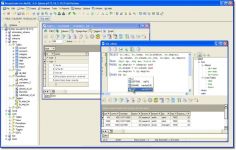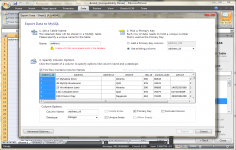 MySQL 5.1.34
MySQL 5.1.34
MySQL AB - (Open Source)
MySQL is a successful open source database used in most web applications, e-commerce and online transaction processing.
MySQL is one of the world's most famous and used open source database. The software can be used to manage web applications, e-commerce and online transaction processing since MySQL database incorporates support those transactions. It is also commonly associated with PHP when it comes to managing websites.
With standard JDBC , ODBC, and Net, the developer can choose the programming language. MySQL has the advantage of working with almost all the popular operating systems and communicate easily with programming languages ​​such as C, C + +, VB, C #, PHP, Python, Ruby, Java, Perl, Eiffel, etc.MySQL replication allows you to create profitable applications. In addition, it enables the development of typologies replication complex and massive chain.Its reliability and robustness, performance, ease of use makes MySQL have more success than anticipated.
- Title:
- MySQL 5.1.34
- File Size:
- 35.5 MB
- Requirements:
- Windows 9x / 2000 / XP / Vista / Windows7 / Windows8
- Language:
- en-us
- License:
- Open Source
- Date Added:
- 19 Apr 2009
- Publisher:
- MySQL AB
- Homepage:
- http://www.mysql.com
- MD5 Checksum:
- 858F3EE53D0DB14E915F330F9FDDEAC1
* Replication: Important Note: Binary logging with --binlog_format=ROW failed when a change to be logged included more than 251 columns. This issue was not known to occur with mixed-format or statement-based logging. (Bug#42977)
See also Bug#42914.
* Replication: Assigning an invalid directory for the --slave-load-tmpdir caused the replication slave to crash. (Bug#42861)
* Replication: The mysql.procs_priv system table was not replicated. (Bug#42217)
* Replication: An INSERT DELAYED into a TIMESTAMP column issued concurrently with a an insert on the same column not using DELAYED, but applied after the other insert, was logged using the same timestamp as generated by the other (non-DELAYED) insert. (Bug#41719)
* Replication: The MIXED binary logging format did not switch to row-based mode for statements containing the LOAD_FILE() function. (Bug#39701)
* Replication: When the server SQL mode included IGNORE_SPACE, statement-based replication of LOAD DATA INFILE ... INTO tbl_name failed because the statement was read incorrectly from the binary log; a trailing space was omitted, causing the statement to fail with a syntax error when run on the slave. (Bug#22504)
See also Bug#43746.
* An attempt by a user who did not have the SUPER privilege to kill a system thread could cause a server crash. (Bug#43748)
* On Windows, incorrectly specified link dependencies in CMakeLists.txt resulted in link errors for mysql_embedded, mysqltest_embedded, and mysql_client_test_embedded. (Bug#43715)
* mysql crashed if a request for the current database name returned an empty result, such as after the client has executed a preceding SET sql_select_limit=0 statement. (Bug#43254)
* If the value of the version_comment system variable was too long, the mysql client displayed a truncated startup message. (Bug#43153)
* Queries of the following form returned an empty result:
SELECT ... WHERE ... (col=col AND col=col) OR ... (false expression)
(Bug#42957)
* The strings/CHARSET_INFO.txt file was not included in source distributions. (Bug#42937)
* A dangling pointer in mysys/my_error.c could lead to client crashes. (Bug#42675)
* Passing an unknown time zone specification to CONVERT_TZ() resulted in a memory leak. (Bug#42502)
* With more than two arguments, LEAST(), GREATEST(), and CASE could unnecessarily return Illegal mix of collations errors. (Bug#41627)
* The mysql client could misinterpret its input if a line was longer than an internal buffer. (Bug#41486)
* In the help command output displayed by mysql, the description for the c (clear) command was misleading. (Bug#41268)
* The load_defaults(), my_search_option_files() and my_print_default_files() functions in the C client library were subject to a race condition in multi-threaded operation. (Bug#40552)
* If --basedir was specified, mysqld_safe did not use it when attempting to locate my_print_defaults. (Bug#39326)
* When MySQL was configured with the --with-max-indexes=128 option, mysqld crashed. (Bug#36751)
* Setting the join_buffer_size variable to its minimum value produced spurious warnings. (Bug#36446)
* The use of NAME_CONST() can result in a problem for CREATE TABLE ... SELECT statements when the source column expressions refer to local variables. Converting these references to NAME_CONST() expressions can result in column names that are different on the master and slave servers, or names that are too long to be legal column identifiers. A workaround is to supply aliases for columns that refer to local variables.
Now a warning is issued in such cases that indicate possible problems. (Bug#35383)
* An attempt to check or repair an ARCHIVE table that had been subjected to a server crash returned a 144 internal error. The data appeared to be irrecoverable. (Bug#32880)
* The Time column for SHOW PROCESSLIST output and the value of the TIME column of the INFORMATION_SCHEMA.PROCESSLIST table now can have negative values. Previously, the column was unsigned and negative values were displayed incorrectly as large positive values. Negative values can occur if a thread alters the time into the future with SET TIMESTAMP = value or the thread is executing on a slave and processing events from a master that has its clock set ahead of the slave. (Bug#22047)
* Restoring a mysqldump dump file containing FEDERATED tables failed because the file contained the data for the table. Now only the table definition is dumped (because the data is located elsewhere). (Bug#21360)
Related software
2.1/5 from 178 users


